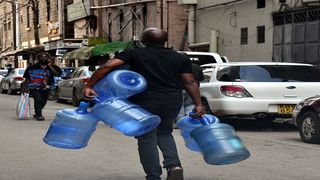
To get bottled water from the more popular brands, one must go to big-name supermarkets, with refills going for more than Sh600 for a 20-litre bottle.
| Francis Nderitu | Nation Media GroupBusiness
Premium
Small players seek a piece of the bottled water millions
Drinking water points continue to dot city estates as new players seek to pinch a piece of the lucrative segment from larger operators.
Water vendor stations mushroomed in the market and in Nairobi estates after the Covid-19 pandemic struck in March 2020.
That was the beginning of the end for many. People closed up their businesses, others were laid off and many lost their sources of income.
But it was also the beginning of fruitful businesses for others, who saw a business opportunity in water vending and grabbed it.
Hannah Njeri, a water vendor with Ravin Streams in Mirema estate, Roysambu, Nairobi, started her business in March 2020 during the pandemic. It purifies water and provides refills.
“I was looking for a business to start that was not slow and what came to mind was the water vending business, because who can do without water?” Ms Njeri said as she giggles.
She said 2021 was a good year for her business.
“As we speak now, people are warming up to the idea of water refilling in the estates, compared to 2020, when people did not fully understand about this business and most doubted the safety of the water for consumption.”
The business model is simple: open a refilling station in a populated estate, employ a delivery person and refill from as little as one litre. The icing on the cake is the pricing.
Small operators dot virtually all densely populated estates, selling a 20-litre container for between Sh100 and Sh200.
In comparison, to get bottled water from the more popular brands, one must go to big-name supermarkets, with refills going for more than Sh600 for a 20-litre bottle.
Roselyn Wangechi, a resident of Ruaka in Nairobi, discovered the refill stations in August 2020, when her friend referred her to one.
“Since I discovered these refills I have never looked back. After my friend introduced me to this, I do not refill in supermarkets anymore. This is cheaper and quite convenient because it’s close to where I live,” she said.
Like any other business, water refill stations have their challenges. Ms Njeri, the water vendor, explains that it was hard for her to get customers at the beginning but she was determined to succeed.
People used to ask why we refill at cheaper prices compared to the big brands. There are also so many water refill stations in the estates, making the competition tough
~she said.
“Many of our competitors refill with prices as low as Sh100 for 20 litres, so it makes it hard sometimes.”
And Njeri insists that her water is safe to drink.
“I purify my water using reverse osmosis. Reverse osmosis is a water purification process that uses a partially absorbent membrane to separate unwanted molecules and larger particles from drinking water, then putting it in storage tanks.”
She admits that she gets her water from the Nairobi City Water and Sewerage Company. She then stores it in tanks because supply is unreliable.
Critics suggest that the estate refillers do not pay their share of taxes and this is why they sell their water at lower prices.
In July 2020, the Kenya Revenue Authority warned that some water refillers were not licensed and that they were not charging and remitting excise duty as required by the law.
“KRA wishes to remind all persons who are engaged in the business of bottling (including through refilling) or packaging water that they are required to obtain an excise licence from KRA and also charge and remit excise duty as required by the law,” the authority said.
KRA also requires water refillers to affix excise stamps on each bottle they package of refill. Most estate vendors disregard this.
A seller is required to obtain an excise licence and remit to KRA Sh5.47 per month for every litre of water sold.
Ms Njeri says she refills a 20-litre bottle at Sh200; 10 litres at Sh100 and five litres at Sh50. For every 20 litres, she pays Sh114 as tax.
“In one day, I can refill up to 25 bottles of water, which means I can make Sh5,000 on a good day. I pay about Sh4,000 to NCWSC per month,” Ms Njeri offers.
In an interview, Kenya Bureau of Statistics Managing (Kebs) Director Bernard N. Njiraini said the agency is not involved in licensing water vendors but their mandate is to come up with certification standards.
They also inspect refill stations to confirm that vendors who are already licensed comply with “relevant code of practice and national standards in order to ensure that water dispensed to the consumers is safe”.
“The applicant must be a legally registered entity with a valid business permit and a licence for commercial use of municipal water or a permit issued by the Water Resources Management Authority (WRMA) for borehole water, and the applicant must be in possession of a valid public health certificate that allows them to conduct the business in the premises,” he said.
For quality assurance, Kebs conducts periodic inspections of the production facilities, sampling and testing the products.
Kebs also does market surveillance activities – monitoring of water in the market - to ensure that it conforms to relevant technical regulations with respect to health, safety and environmental requirements, and to ensure that fair trade practices are promoted.
“Once the products are certified, the vendor is issued with a standardisation mark permit number for potable water and they should produce it on-demand,” he said.





